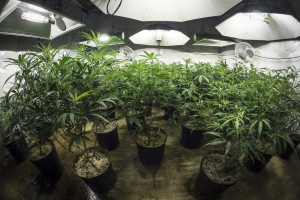 In the final days of the Maryland legislative session, top democrats agreed to the expansion of medical marijuana growers in the state. Two top lawmakers in particular, Senate President Thomas V. Mike Miller and House Speaker Michael Busch, showed their support by writing a letter in July requesting passage of “emergency legislation” in the legislation session beginning January.
In the final days of the Maryland legislative session, top democrats agreed to the expansion of medical marijuana growers in the state. Two top lawmakers in particular, Senate President Thomas V. Mike Miller and House Speaker Michael Busch, showed their support by writing a letter in July requesting passage of “emergency legislation” in the legislation session beginning January.
Even with these steps forward, there are still many issues to discuss. For example, lawmakers are still wrestling over which businesses should be given entry into the lucrative marijuana market. Fifteen companies were preapproved last year by regulators. If they pass all final inspections and background checks, they’ll be cleared to open cultivation sites. And what about marijuana credit card processing? With strict federal regulations, merchants are unable to secure processing and funding from traditional financial institutions. Most turn to an alternative provider like Marijuana Merchant Account (MMA).
There have been other obstacles in the process of approving five additional growing licenses. In the final days of the legislative session, House and Senate negotiators battled over a compromise concerning how many new licenses should be issued, along with whether the number of growers should be reduced if a company fails inspection.
If the new bill was passed, it would also favor minority-owned companies. This addition is lawmakers attempt to address concerns raised when two companies sued the state after their application was rejected in favor of lower-ranked bids. According to The Washington Post, these lower-ranked bids were from “geographic regions of Maryland where no growers had been approved”.
Opposition arose to expand the Maryland marijuana market, surprisingly, from the fifteen businesses that have already been given cultivation licenses. These companies have banded together to oppose expanding the market. According to them, this expansion completely derails their business plans and pitches to investors; their plans were based on the expectation that they would have exclusive foothold of the marijuana industry in Maryland.
“Our members relied on commitments from the state when making their business decisions, and it is reasonable for them to expect that the state would honor those commitments,” says Jake Van Wingerden, President of Cecil County’s SunMed Growers. “Many of our members are just months away from delivering medical cannabis to patients, and we are opposed to any changes that would cause additional delays to this important program.”
Unfortunately, the session came to a close with no resolution. The bill was pushed off until 11:55p.m. – with a midnight deadline – before it came up before the full House. Republican lawmakers then delayed the vote by asking questions until the clock hit midnight. The 90-day session came to a close.
The result: none of the companies that received the green light to start growing Maryland’s first legal marijuana belong to African Americans, and the legal battle with two rejected applicants continues (they planned to drop the lawsuit if the bill was passed). The decision may be delayed, but the push for growth continues.





 The marijuana industry is almost unrecognizable when you compare what it is today with what it was a couple of decades ago. Far from the completely black market, the marijuana industry is now valued at $4 billion a year. In addition, things have transitioned from farmers hiding from helicopters to business suits and legal transactions. Before, funding and payment processing were impossible. Now, alternative lenders offer quick, flexible solutions (consider Marijuana Merchant Account). No more hiding in the shadows.
The marijuana industry is almost unrecognizable when you compare what it is today with what it was a couple of decades ago. Far from the completely black market, the marijuana industry is now valued at $4 billion a year. In addition, things have transitioned from farmers hiding from helicopters to business suits and legal transactions. Before, funding and payment processing were impossible. Now, alternative lenders offer quick, flexible solutions (consider Marijuana Merchant Account). No more hiding in the shadows. Next year, billions of dollars are expected to flood the California’s marijuana industry when recreational cannabis is made legal. Even so, these businesses will struggle to secure the services they need with their local banks. But why would such a profitable industry with so much potential experience issues securing solutions with a traditional lender?
Next year, billions of dollars are expected to flood the California’s marijuana industry when recreational cannabis is made legal. Even so, these businesses will struggle to secure the services they need with their local banks. But why would such a profitable industry with so much potential experience issues securing solutions with a traditional lender? When it comes to the legal marijuana industry, many people assume it’s a small, struggling group of people. While it’s true that the industry has encountered many obstacles and likely has more to face in the future, you might be surprised to hear that the industry is a lot bigger than you previously believed. For example, if your living in one of the legal marijuana states, it might actually be easier for you to find someone to recommend and sell you cannabis than to find a dental hygienist.
When it comes to the legal marijuana industry, many people assume it’s a small, struggling group of people. While it’s true that the industry has encountered many obstacles and likely has more to face in the future, you might be surprised to hear that the industry is a lot bigger than you previously believed. For example, if your living in one of the legal marijuana states, it might actually be easier for you to find someone to recommend and sell you cannabis than to find a dental hygienist. Many in the marijuana industry were optimistic when they read the recent report from the U.S. Department of The Treasury’s Financial Crimes Enforcement Network (FinCEN). This report revealed a sizeable increase in the number of banks and credit unions providing financial services to legal marijuana business. In FinCEN’s latest Marijuana Banking Update, 368 depository institutions were “actively banking marijuana businesses in the United States” at the end of the first period (March 31).
Many in the marijuana industry were optimistic when they read the recent report from the U.S. Department of The Treasury’s Financial Crimes Enforcement Network (FinCEN). This report revealed a sizeable increase in the number of banks and credit unions providing financial services to legal marijuana business. In FinCEN’s latest Marijuana Banking Update, 368 depository institutions were “actively banking marijuana businesses in the United States” at the end of the first period (March 31). Up until a few years ago the only way to get recreational marijuana was illegally. This benefitted mostly the drug cartels – and honestly, who wants to do that? With the rise of states offering legalized recreational marijuana, the cartels are likely to take a hit – but how much? And will this help eradicate marijuana cartels?
Up until a few years ago the only way to get recreational marijuana was illegally. This benefitted mostly the drug cartels – and honestly, who wants to do that? With the rise of states offering legalized recreational marijuana, the cartels are likely to take a hit – but how much? And will this help eradicate marijuana cartels? With the ever-growing support for legalized medical and recreational marijuana, it is hard to fathom that some states may never legalize one or the other (or both). But, there are 14 states that may never do so. It isn’t the money, per se, but it has a lot to do with politics.
With the ever-growing support for legalized medical and recreational marijuana, it is hard to fathom that some states may never legalize one or the other (or both). But, there are 14 states that may never do so. It isn’t the money, per se, but it has a lot to do with politics.